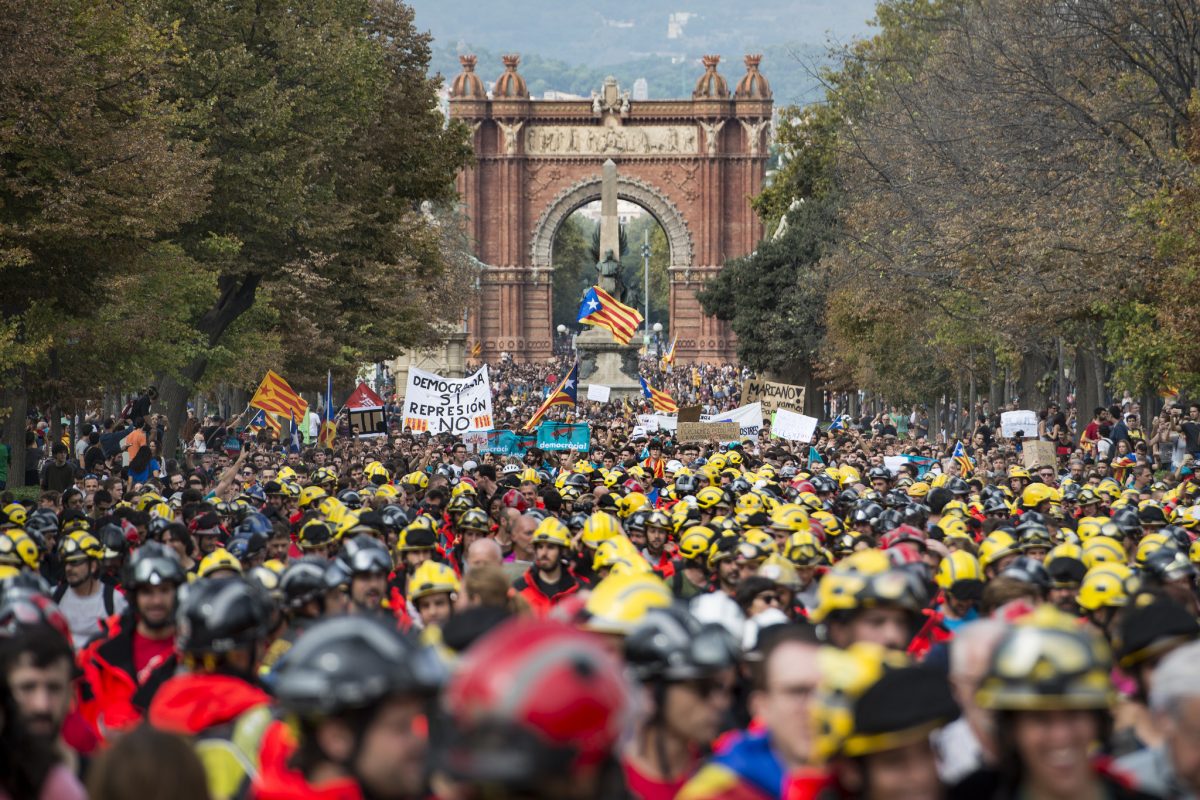Decentralised technologies mean censorship-resistant websites

As I write this, I’m in an apartment in Barcelona, after speaking and running a workshop at an event.
On Sunday, there was a vote for Catalonian independence. It went ahead due to the determination of teachers (who kept schools open as voting centres), the bravery of firemen and Catalan police (who resisted Spanish police), and… technology.
As I mentioned in the first section of my presentation on Wednesday, I’m no expert on Spanish politics, but I am very interested in the Catalonian referendum from a technological point of view. Not only did the Spanish government take a heavy-handed approach by sending in masked police to remove ballot boxes, but they applied this to the digital domain, raiding internet service providers, blocking websites, and seizing control of referendum-related websites.
Yet, people still accessed websites that helped them vote. In fact, around 42% managed to do so, despite all of the problems and potential danger in doing so. By way of contrast, no more than 43% of the population has ever voted in a US Presidential election (see comments section). There have been claims of voting irregularities (which can be expected when Spanish police were using batons and rubber bullets), but of those who voted, 90% voted in favour of independence.
People managed to find out the information they required through word of mouth and via websites that were censorship-resistant. The technologists responsible for keeping the websites up despite interference from Madrid used IPFS, which stands for Inter Planetary File System. IPFS is a decentralised system which manages to remove the reliance on a single point of failure (or censorship) while simultaneously solving problems around inefficiencies caused by unecessary file duplication.
The problem with IPFS, despite its success in this situation is that it’s mainly used via the command line. As much as I’d like everyone to have some skills around using terminal windows, realistically that isn’t likely to happen anytime soon in a world of Instagram and Candy Crush.
Instead, I’ve been spending time investigating ZeroNet, which is specifically positioned as providing “open, free and uncensorable websites, using bitcoin cryptography and bitorrent network”. Instead of there being ‘gateways’ through which you can access ZeroNet sites through the open web, you have to install it and then run it locally in a web browser. It’s a lot easier than it sounds, and the cross-platform functionality has an extremely good-looking user interface.
I’ve created a ‘Doug, uncensored’ blog using ZeroNet. This can be accessed via anyone who is running the service and knows the (long) address. When you access the site you’re accessing it on your own machine and then serving it up to — just like with bittorrent. It’s the realisation of the People’s Cloud idea that Vinay Gupta came up with back in 2013. The great thing about that is the websites work even when you’re offline, and sync when you re-connect.
As with constant exhortations for people to be more careful about their privacy and security, so decentralised technologies might seem ‘unnecessary’ by most people when everything is going fine. However, just as we put curtains on our windows and locks on our doors, and sign contracts ‘just in case’ something goes wrong, so I think decentralised technologies should be our default.
Why do we accept increased centralisation and surveillance as the price of being part of the digital society? Why don’t we take back control?
Again, as I mentioned in my presentation on Wednesday, we look backwards too much when we’re talking about digital skills, competencies, and literacies. Instead, let’s look forward and ensure that the next generation of technologies don’t sell us down the river for advertising dollars.
Have a play with ZeroNet and, if you want to really think through where we might be headed with all of this, check out Bitnation.
Image CC BY-NC-ND Adolfo Luhan

> By way of contrast, no more than 43% of the population has ever voted in a US Presidential election.
This is wrong. It’s no more than 43 percent of the *population*. In the United States, children, illegal immigrants and people with felony convictions can be prevented from voting., and are therefore not part of the electorate.
The most recent election saw 55.7% of the voting-age population cast votes. This is up from 2012 but down from the previous two elections. http://www.pewresearch.org/fact-tank/2017/05/15/u-s-voter-turnout-trails-most-developed-countries/
Thanks Stephen. I’ll update the post, but the point remains that it’s a pretty healthy turnout amidst police repression…
Interesting post Doug and a very sad situation in Barcelona that has left Spanish people conflicted. No-one should be comfortable seeing the very agents we rely on to look after the security of ordinary people brutalising their own citizens. The wave of authoritarianism we are seeing in the world is very worrying. As you say we need also to be aware of the dangers of censorship extending to the virtual world too.
The brexiteers now famous “take back control” rallying cry however would not be a tagline I could embrace! I would defend everyone’s right to a voice and, like the EU, call for all to engage in constructive dialogue rather than heavy handed knee jerk reactions. As you suggest though we need to keep the channels open, be they face to face or online.
Indeed, Teresa. Having such a great time here, too amongst cheerful, peace-loving people 🙂